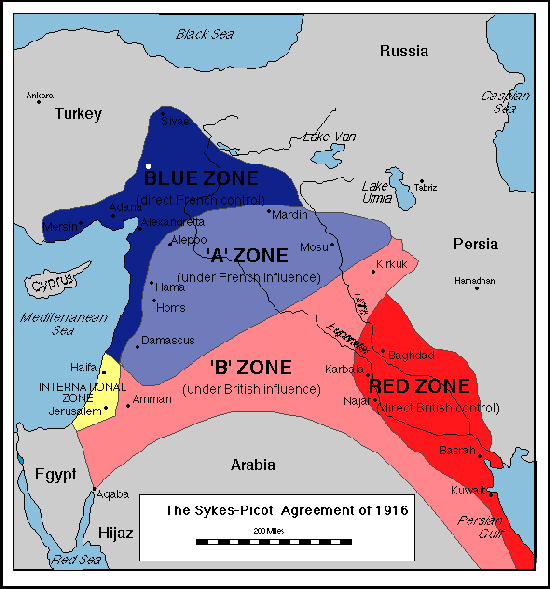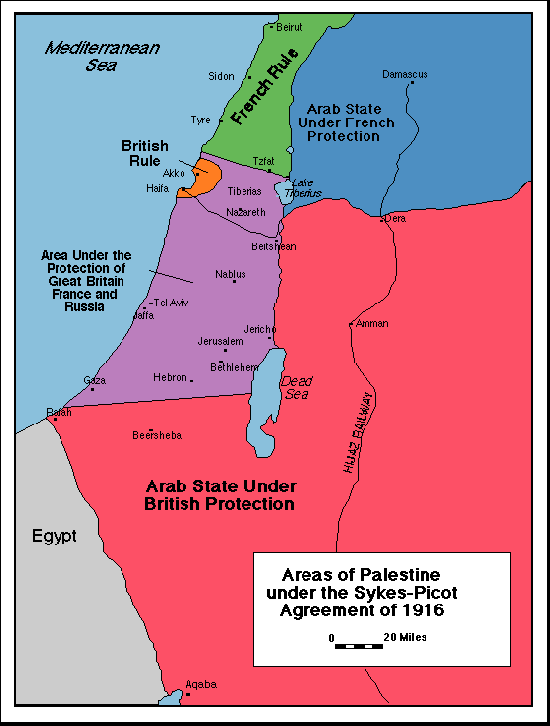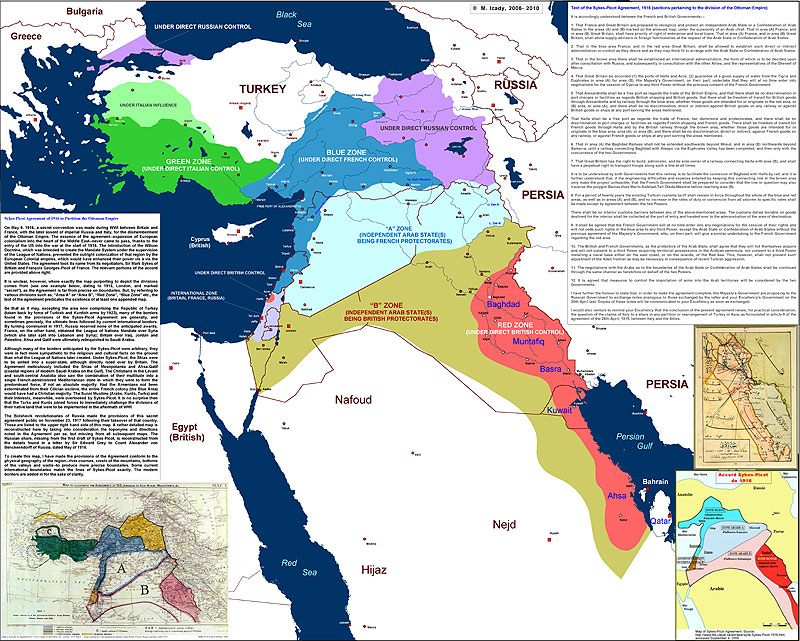![]()
Sun, Dec 13, 2009 | Edited by Crethi Plethi
The Sykes – Picot agreement (1916)
The Sykes-Picot (-Sazonov) agreement, concluded on 16 may 1916, was an agreement between the Governments of Britain and France and with the consent of the Russian Empire about dividing the Middle East in spheres of influence and foreign control following the downfall of the Ottoman Empire (Turks) after WW1. Set aside in the agreement was the establishment of an independent Arab state or confederation of Arab states, thus agreed also in the McMahon-Husayn Correspondence (1915-1916). The Governments of France and Britain were also given the rights of setting boundaries within their spheres of influence.
The agreement was negotiated by François Georges-Picot (french diplomat) and Sir Mark Sykes (british diplomat). Sergei Dmitrievich Sazonov was the Russian Foreign Minister who alongside the Sykes-Picot agreement was granted the general favour from the WW1 allies to the post-war occupation of certain parts of the Ottoman Empire (Constantinople, the European side of the Dardanelles, the Bosporus strait and the Ottoman Armenian Vilayets). Britain was granted control over (what’s called today) Jordan, southern Iraq and Haifa (Israel). France was granted control over Syria, Lebanon, northern Iraq, Mosul and south-eastern Turkey (including Kurdistan). The region of Palestine (except Haifa) was set for International Rule under consultation from the Allied Powers and Sharif Husayn of Mecca.
Sir Mark Sykes and François Georges-Picot visited the Hijaz Monarchy in 1917 to discuss the agreement with Sharif Husayn ibn Ali of Mecca and its effects on the McMahon-Husayn terms in relation to the setting of the borders of an independent Arab State. The Sykes-Picot agreement is seen by many as a turning point in the Arab-Western relations due to disregarding the promises made for an independent Arab state in certain areas of the Middle East (e.g. Syria and northern Palestine) by the allied powers.
The Anglo-French ‘Arab’ proposals was discussed in an exchange of letters (from April 13 to Oct 23, 1916) between the Russian Foreign Minister, Sazonov, the French Ambassador in petrograd, M. Paléologue, British Secretary of State for foreign Affairs Edward Grey (and in August, Crewe), the French Ambassador in London, P. Cambon, and the Russian Ambassador in London, Count Benckendorff, agreeing to and slightly further defining the proposals already discussed in London and Petrograd and to transform the Sykes-Picot ‘Arab proposals’ into the Sykes-Picot Agreement.
The Sykes-Picoy Agreement (1916)
— from official papers, 15 and 16 may, 1916: by Sir Edward Grey (British Secretary of State for foreign Affairs) to Pierre Paul Cambon (French ambassador to Britain, London)
Sir Edward Grey to Pierre Paul Cambon, 15 May 1916:
I shall have the honour to reply fully in a further note to your Excellency’s note of the 9th instant, relative to the creation of an Arab State, but I should meanwhile be grateful if your Excellency could assure me that in those regions which, under the conditions recorded in that communication, become entirely French, or in which French interests are recognised as predominant, any existing British concessions, rights of navigation or development, and the rights and privileges of any British religious, scholastic, or medical institutions will be maintained.
His Majesty’s Government are, of course, ready to give a reciprocal assurance in regard to the British area.
Sir Edward Grey to Paul Cambon, 16 May 1916:
I have the honour to acknowledge the receipt of your Excellency’s note of the 9th instant, stating that the French Government accept the limits of a future Arab State, or Confederation of States, and of those parts of Syria where French interests predominate, together with certain conditions attached thereto, such as they result from recent discussions in London and Petrograd on the subject.
I have the honour to inform your Excellency in reply that the acceptance of the whole project, as it now stands, will involve the abdication of considerable British interests, but, since His Majesty’s Government recognise the advantage to the general cause of the Allies entailed in producing a more favourable internal political situation in Turkey, they are ready to accept the arrangement now arrived at, provided that the co-operation of the Arabs is secured, and that the Arabs fulfil the conditions and obtain the towns of Homs, Hama, Damascus, and Aleppo.
Text of Sykes-Picot Agreement, 1916 (sections pertaining to the division of the Ottoman Empire).
It is accordingly understood between the French and British Governments: —
1. That France and Great Britain are prepared to recognize and protect an independent Arab State or a Confederation of Arab States in the areas (A) and (B) marked on the annexed map, under the suzerainty of an Arab chief. That in area (A) France, and in area (B) Great Britain, shall have priority of right of enterprise and local loans. That in area (A) France, and in area (B) Great Britain, shall alone supply advisers or foreign functionaries at the request of the Arab State or Confederation of Arab States.
2. That in the blue area France, and in the red area Great Britain, shall be allowed to establish such direct or indirect administration or control as they desire and as they may think fit to arrange with the Arab State or Confederation of Arab States.
3. That in the brown area there shall be established an international administration, the form of which is to be decided upon after consultation with Russia, and subsequently in consultation with the other Allies, and the representatives of the Shereef of Mecca.
4. That Great Britain be accorded (1) the ports of Haifa and Acre, (2) guarantee of a given supply of water from the Tigris and Euphrates in area (A) for area (B). His Majesty’s Government, on their part, undertake that they will at no time enter into negotiations for the cession of Cyprus to any third Power without the previous consent of the French Government.
5. That Alexandretta shall be a free port as regards the trade of the British Empire, and that there shall be no discrimination in port charges or facilities as regards British shipping and British goods; that there shall be freedom of transit for British goods through Alexandretta and by railway through the blue area, whether those goods are intended for or originate in the red area, or (B) area, or area (A); and there shall be no discrimination, direct or indirect against British goods on any railway or against British goods or ships at any port serving the areas mentioned.
That Haifa shall be a free port as regards the trade of France, her dominions and protectorates, and there shall be no discrimination in port charges or facilities as regards French shipping and French goods. There shall be freedom of transit for French goods through Haifa and by the British railway through the brown area, whether those goods are intended for or originate in the blue area, area (A), or area (B), and there shall be no discrimination, direct or indirect, against French goods on any railway, or against French goods or ships at any port serving the areas mentioned.
6. That in area (A) the Baghdad Railway shall not be extended southwards beyond Mosul, and in area (B) northwards beyond Samarra, until a railway connecting Baghdad with Aleppo via the Euphrates Valley has been completed, and then only with the concurrence of the two Governments.
7. That Great Britain has the right to build, administer, and be sole owner of a railway connecting Haifa with area (B), and shall have a perpetual right to transport troops along such a line at all times.
It is to be understood by both Governments that this railway is to facilitate the connexion of Baghdad with Haifa by rail, and it is further understood that, if the engineering difficulties and expense entailed by keeping this connecting line in the brown area only make the project unfeasible, that the French Government shall be prepared to consider that the line in question may also traverse the polygon Banias-Keis Marib-Salkhab Tell Otsda-Mesmie before reaching area (B).
8. For a period of twenty years the existing Turkish customs tariff shall remain in force throughout the whole of the blue and red areas, as well as in areas (A) and (B), and no increase in the rates of duty or conversion from ad valorem to specific rates shall be made except by agreement between the two Powers.
There shall be no interior customs barriers between any of the above-mentioned areas. The customs duties leviable on goods destined for the interior shall be collected at the port of entry and handed over to the administration of the area of destination.
9. It shall be agreed that the French Government will at no time enter into any negotiations for the cession of their rights and will not cede such rights in the blue area to any third Power, except the Arab State or Confederation of Arab States without the previous agreement of His Majesty’s Government, who, on their part, will give a similar undertaking to the French Government regarding the red area.
10. The British and French Governments, as the protectors of the Arab State, shall agree that they will not themselves acquire and will not consent to a third Power acquiring territorial possessions in the Arabian peninsula, nor consent to a third Power installing a naval base either on the east coast, or on the islands, of the Red Sea. This, however, shall not prevent such adjustment of the Aden frontier as may be necessary in consequence of recent Turkish aggression.
11. The negotiations with the Arabs as to the boundaries of the Arab State or Confederation of Arab States shall be continued through the same channel as heretofore on behalf of the two Powers.
12. It is agreed that measures to control the importation of arms into the Arab territories will be considered by the two Governments.
I have further the honour to state that, in order to make the agreement complete, His Majesty’s Government are proposing to the Russian Government to exchange notes analogous to those exchanged by the latter and your Excellency’s Government on the 26th April last. Copies of these notes will be communicated to your Excellency as soon as exchanged.
I would also venture to remind your Excellency that the conclusion of the present agreement raises, for practical consideration, the question of the claims of Italy to a share in any partition or rearrangement of Turkey in Asia, as formulated in article 9 of the agreement of the 26th April, 1915, between Italy and the Allies.
His Majesty’s Government further consider that the Japanese Government should be informed of the arrangement now concluded.
— from official papers, may/October, 1916: by Sir Edward Grey (British Secretary of State for foreign Affairs) to Alexander Konstantinovitsj Count Von Benckendorff (Russian ambassador to Britain, London)
Sir Edward Grey to Alexander Konstantinovitsj Count Von Benckendorff, May 1916:
I have received from the French ambassador in London copies of the notes exchanged between the Russian and French governments on the 26th ultimo, by which your excellency’s government recognize, subject to certain conditions, the arrangement made between great Britain and France, relative to the constitution of an Arab state or a confederation of Arab states, and to the partition of the territories of Syria, Cilicia, and Mesopotamia, provided that the co-operation of the Arabs is secured.
His majesty’s government take act with satisfaction that your excellency’s government concur in the limits set forth in that arrangement, and I have now the honor to inform your excellency that his majesty’s government, on their part, in order to make the arrangement complete, are also prepared to recognize the conditions formulated by the Russian government and accepted by the French government in the notes exchanged at Petrograd on the 26th ultimo.
In so far, then, as these arrangements directly affect the relations of Russia and great Britain, I have the honor to invite the acquiescence of your excellency’s government in an agreement on the following terms:
1. That Russia shall annex the regions of Restroom, Trapezoid, van, and Battles, up to a point subsequently to be determined on the littoral of the black sea to the west of Trapezoid.
2. That the region of Kurdistan to the south of van and of Battles between Mush, Sort, the course of the Tigris, Jazzier Ben Omar, the crest line of the mountains which dominate Acadia, and the region or Merge Vary, shall be ceded to Russia; and that starting from the region of Merge Vary, the frontier of the Arab state shall follow the crest line of the mountains which at present divide the ottoman and Persian dominions, these boundaries are indicated in a general manner and are subject to modifications of detail to be proposed later by the delimitation commission which shall meet on the spot.
3. That the Russian government undertake that, in all parts of the ottoman territories thus ceded to Russia, and concessions accorded to British subjects by the ottoman government shall be maintained, if the Russian government express the desire that such concessions should later be modified in order to bring them into harmony with the laws of the Russian empire, this modification shall only take place in agreement with the British government.
4. That in all parts of the ottoman territories ceded to Russia, existing British rights of navigation and development, and the rights and privileges of any British religious, scholastic, or medical institutions shall be maintained. His majesty’s government, on their part, undertakes that similar Russian rights and privileges shall be maintained in those regions which, under the conditions of this agreement, become entirely British, or in which British interests are recognized as predominant.
5. The two governments admit in principle that every state which annexes any part of the ottoman empire is called upon to participate in the service of the ottoman debt.
Sir Edward Grey
Sir Edward Grey to Alexander Konstantinovitsj Count Von Benckendorff, October 1916:
In reply to your Excellency’s note of the 1st ultimo, regarding the arrangement between great Britain, Russia, and France, relative to the creation of an Arab state, or of a confederation of Arab states, and to the partition of the territories of Syria, Cilicia, and Mesopotamia, provided that the cooperation of the Arabs is secured, i have the honor to state that his majesty’s government take note of the reservation formulated by the imperial Russian government at the end of article 4 of the arrangement respecting the rights of the imperial government to grant sabotage in the black sea, and of the desire manifested by that government that this question should be submitted later to a friendly examination by the governments of the parties interested.
Sir Edward Grey



 RSS
RSS













[…] As it turned out, the British eventually had made conflicting promises to various parties (France, Russia, Jews, Arabs) to gain support during the first World War, which they could not keep. Therefore, the interpretations of the letters have been disputed ever since. See also: The Sykes-Picot agreement (1916). […]
[…] rights to the same land to the French, the Arabs and the Jews in three different agreements, the Sykes-Picot agreement, the McMahon-Hussein correspondence, and the Lord Balfour Declaration. So in 1922, Churchill, in a […]
http://t.co/vjEzdAl9
agreement between the Governments of Britain and France
http://t.co/QfxHW1iR
http://t.co/2xKTWnwT
http://t.co/RWzgg5IG
http://t.co/vjEzdAl9
agreement between the Governments of Britain and France
http://t.co/QfxHW1iR
http://t.co/2xKTWnwT
http://t.co/RWzgg5IG
http://t.co/vjEzdAl9
agreement between the Governments of Britain and France
http://t.co/QfxHW1iR
http://t.co/2xKTWnwT
http://t.co/RWzgg5IG
http://t.co/vjEzdAl9
agreement between the Governments of Britain and France
http://t.co/QfxHW1iR
http://t.co/2xKTWnwT
http://t.co/RWzgg5IG
http://t.co/vjEzdAl9
agreement between the Governments of Britain and France
http://t.co/QfxHW1iR
http://t.co/2xKTWnwT
http://t.co/RWzgg5IG
The Sykes – Picot agreement (1916) – http://t.co/FmbehJoC